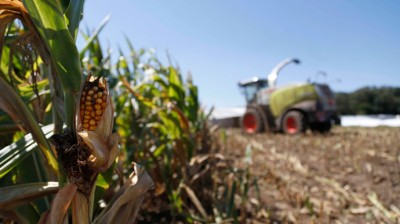
Image source: RT.com
Monsanto, one of the largest biotech companies in the world, is reportedly paying large sums of money to garner massive amounts of data about farms. The agricultural industry data mining is part of a “Smart Farms” effort which could soon change the face of crop generation in the United States.
While some support the efforts by Monsanto and competitors like DuPont, Bayer, and Sygenta, others are extremely concerned about where all the information collected will wind up and how smart farming could impact grower control over health and safety issues.
The American Farm Bureau Federation recently published a potential risks outline relating to the data mining in the agricultural industry and on farm tools.
In October Monsanto spent nearly $1 billion to purchase the Climate Corporation, a data analysis firm. In 2012 the biotech giant also bought Precision Planting, a “high tech” agricultural firm, and initiated a venture capital arm of the company in order to offer funding to tech start-ups, according to Salon.
Monsanto has not issued a public statement about the “ownership” of the raw data collected from farmers and whether or not the information will be maintained in a non-proprietary format, Salon reported. Some farmers and organizations which represent the industry are worried that biotech giants like Monsanto will “harness the data” for the purpose of price discrimination. In such a scenario, the company could charge some farmers more for the same product or service. If such a circumstance materializes, a company could easily and quickly determine the economic value the farmers accrues and vary prices more specifically by region or even by community. Monsanto reportedly determines product price on a regional basis, Illinois farmers could pay more for seeds than a Texas farmer who is facing a drought, for example.
New Survival Seed Bank™ Lets You Plant A Full Acre Crisis Garden!
Kyle Cline, policy advisor for national government relations at the Indiana Farm Bureau, said:
If this real time yield data goes into the cloud and a lot of market investors get into it, there is potential for market distortion. It could destabilize markets, make them more volatile.
Kansas Farm Bureau Director of Commodities Mark Nelson is concerned that farmers’ data could be misused and that agricultural business owners are “signing up for things” without realizing what is being given up. John Deere is also getting in on the data mining. A company representative attempted to assure the public that farmers will still “own their data” and have the chance to opt-out of the cloud services initiated by the popular agricultural equipment manufacturer. John Deere has admitted that its financial department “may consult” data about farm machinery, but only if the farmer permits the information collection.
Said Mark Cox Grower, communications director for the Grower Information Services Cooperative:
Growers need to be proactive in how their information is managed. Otherwise all that economic power will consolidate to these corporations and the grower will be at even more of a disadvantage. We don’t want the grower to become a tenant on his own farm.
Those opposed to smart farming and data mining by companies also fear that private information about crop yields and soil fertility, which some consider trade secrets, would be used for pricing purposes and decrease a natural competitive edge.
“If you inadvertently teach Monsanto what it is that makes you a better farmer than your neighbor, it can sell that information to your neighbor,” John McGuire of Simplified Technology Services, who once developed geospatial tools for Monsanto, told Salon.
How do you feel about smart farming?
Sign up for Off The Grid News’ weekly email and stay informed about the issues important to you
 Off The Grid News Better Ideas For Off The Grid Living
Off The Grid News Better Ideas For Off The Grid Living




